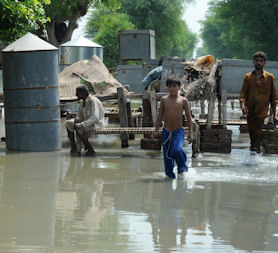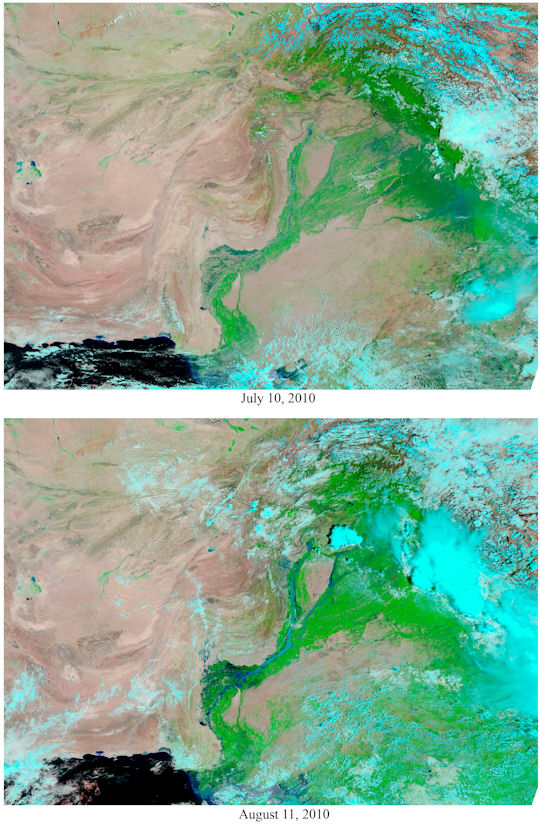Pakistan flood levels expected to surge
Updated on 13 August 2010
As more monsoon storms threaten to surge flood levels higher in the swollen beds of the Indus River in Punjab and Sindh provinces, Channel 4 News Foreign Affairs Correspondent Jonathan Miller writes about the "rising anger and resentment" among the Pakistani people he has met in the last 10 days.

Pakistan's super-flood is panning out as feared, with threats multiplying as time elapses.
The slow-burn catastrophe is posing a logistical nightmare to relief agencies, still struggling to deliver food, shelter and safe drinking water to the six million people most seriously affected. Relief workers say many areas remain unreachable other than by helicopter or by boat.
"The tsunami and the 2005 earthquake in Pakistan were like a heart attack," Mohammed Qazilbash, of Save the Children, told Channel 4 News. "This is like a cancer. It just keeps spreading."
More from Channel 4 News's Jonathan Miller on the floods in Pakistan
- Emergency aid 'not reaching' flood-hit Pakistan
- 'Four million' at risk from Pakistan floods
- '12 million' directly hit by Pakistan floods
- Pakistan floods: desperation as rain continues
- Pakistan floods: military steps up rescue effort
- Pakistan floods: victim number exceeds tsunami
- More rain as Pakistan floods sweep south
The evacuation camps
The hardest hit have been the poorest of the poor, in this country of 190 million people. There are tens of thousands of cases of potentially fatal water-borne diseases and deepening concerns of a cholera epidemic just waiting to happen.
The UN's World Health Organisation (WHO) says it is unable to accurately assess needs because access to some areas is still proving difficult or impossible.
"Children are dying now, as we speak, because of lack of access to clean drinking water," said Pascal Cuttat, Head of the International Committee of the Red Cross in Islamabad, today. The UN said there are now 36,000 cases of acute diarrhoea.
In evacuation camps visited by Channel 4 News, from Khyber Pakhtunkhwa in the northwest, through Punjab and in Sindh province in the south, we have seen many people sick with fever, dysentery and with festering skin infections.
Most displaced people live in makeshift encampments with no sanitation or access to safe water.
Agricultural industry in tatters
The economic impact of the floods has been huge. The World Bank says the value of ruined crops will top a billion dollars. The International Monetary Fund (IMF) is warning of major economic harm and shortages.
Today, 200km south of Sukkur, on the River Indus in Sindh Province, we found vast areas of farmland under water, after a "bund" – a protective dike along the west bank of the river – was breached. More than 200 villages in the district of Dadu have been flooded and evacuated after the water level rose more than 12 metres.
We met local farmers returning from their submerged village by boat. They had gone back to scavenge for construction materials on the roofs of their former homes with which to build temporary lean-to’s in nearby Dadu town. They said all their crops were destroyed.
Across Pakistan, floodwaters are reported to have inundated 700,000 acres of cotton, 200,000 acres of rice and 200,000 acres of sugar cane. The chairman of Agri Forum Pakistan, Mohammed Ibrahim Mohgul, is quoted as saying that half a billion metric tonnes of wheat has been ruined and 300,000 acres of animal fodder destroyed.
As wheat and sugar prices rise, there are food security concerns about the ramifications of Pakistan – the world's sixth most popular country and a major rice and grain exporter – being forced to import food staples.
Mr Moghul added that 100,000 heads of livestock had also been killed. The rotting carcasses of cattle remain a major contaminant to the water supply. The flood water has poisoned ground water, rendering shallow village wells unsafe.
 Anger and resentment
Anger and resentment
Throughout our 10 days in Pakistan reporting on the super-flood, we have encountered rising anger and resentment from those who blame their government for mounting an inadequate response. Commentators in Pakistan say increased desperation could lead to social unrest.
Samina Ahmed, of the International Crisis Group, told Channel 4 News however that "Pakistan is a poor country. After nine years of military rule, it's no surprise that the civilian government is struggling. They can't deliver overnight." The well-funded army, she said, has all the resources and has spearheaded much of the Pakistani relief effort.
Pakistan's Prime Minister, Yusuf Raza Gilani, has today promised that his government will be transparent in the disbursement of relief. But the disaster has failed to win sufficient pledges from international donors to tackle the enormity of the crisis.
The United Nations has appealed for US$459 million but so far just US$195 million has been pledged. The UN Secretary General arrives in Pakistan tomorrow.
How to donate
To make a donation to the DEC Pakistan appeal call the 24 hour hotline on 0370 60 60 900, visit http://www.dec.org.uk or donate over the counter at any post office or high street bank, or send a cheque.
You can also donate £5 by texting the word GIVE to 70707.
Floodwaters are receding in some areas, but further monsoon storms could bring more destruction. The National Disaster Management Agency said major peaks in the Indus River water level are expected in Punjab and Sindh next week.
In the northwest, bad weather has once again grounded the US army's helicopter airlift to people in the Upper Swat Valley, cut-off by landslides and broken bridges. Only 3,089 people have been evacuated since the airlift started on 8 August.
The first two of the 19 extra helicopters ordered by the US Defence Secretary to deploy to Pakistan were unable to land at Ghazi Army Aviation base, in Khyber Pakhtunkhwa, due to persistent rain.
"We want to warn everyone that the crisis facing Pakistan is enormous," said Mengesha Kebede, of the UN refugee agency today. "There continues to be massive destruction as the bloated rivers flow inexorably southwards across the plains."
'As many as 14m could be affected'
Sally Clarke, from the medical aid agency Merlin told Channel 4 News: "The rains are continuing to fall in upper Swat.
"This flood has been quite unlike any other natural disaster in that it is a slow crisis. It's not like the Haiti earthquake, or the Kashmir earthquake or the tsunami.
"It's a slow onset crisis and so as the days go by, more and more people are being affected.
"We think it is 14 million people so far.
"We need to get more medical experts there, making sure people have access to safe water. This is an unprecedented disaster which requires an unprecedented response."





